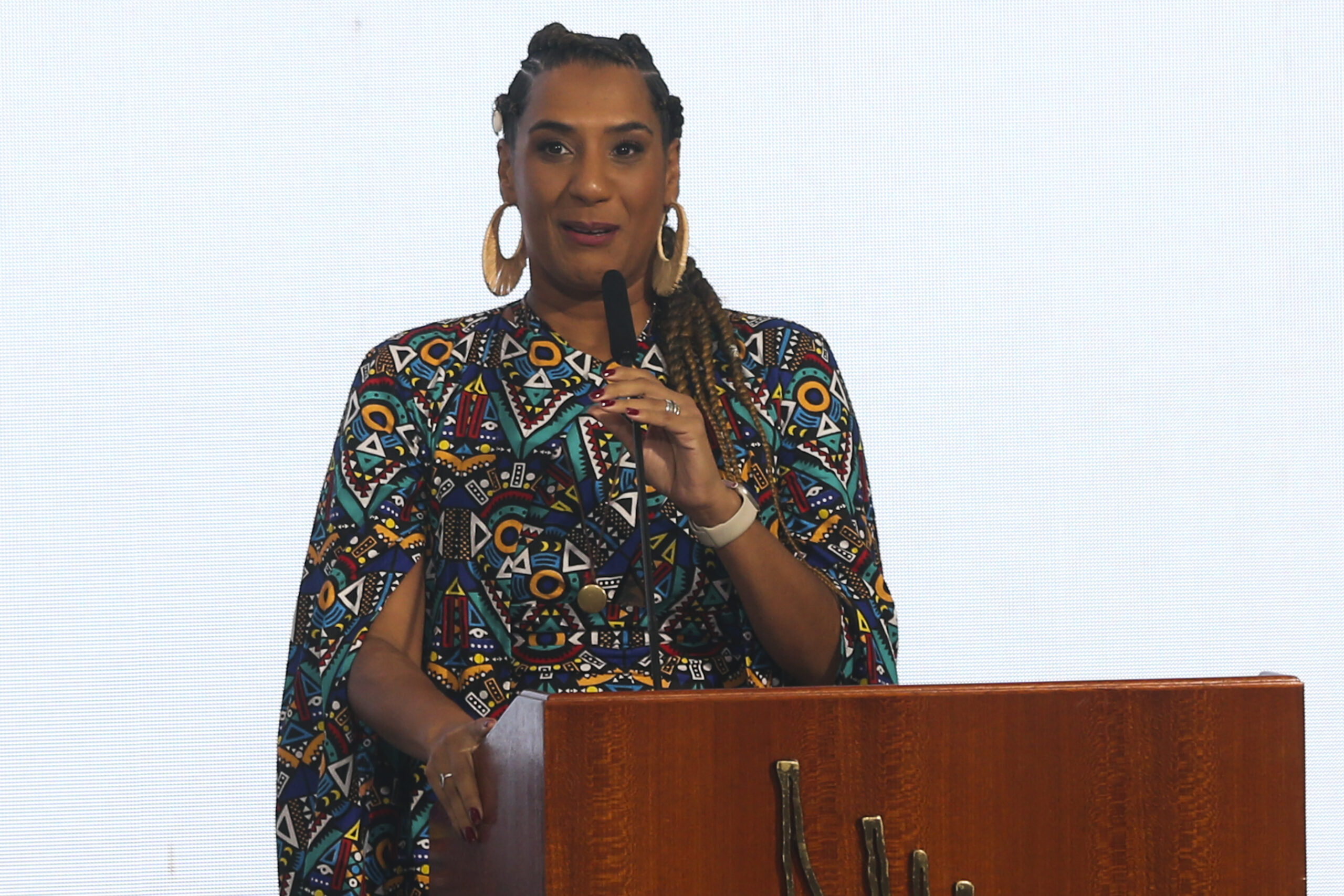
On Wednesday, January 11, 2023, Anielle Franco, born and raised in the Maré Complex of favelas in Rio de Janeiro’s North Zone, was welcomed as Brazil’s first Minister of Racial Equality. Read the full inauguration speech translated by RioOnWatch below, in which Franco remembers her late sister Rio de Janeiro Councilwoman Marielle Franco, who was brutally executed in 2018, and outlines the ongoing fight for inclusion and rights for Black people in Brazil:
First of all, I would like to welcome all those present and make my formal greeting directing myself to President Lula and his wife Janja, to our [former] president Dilma and the ministerial authorities present on behalf of my distinguished colleagues (Minister Luciana Santos, Margareth Menezes, Esther Dweck, Nísia Trindade, Cida Gonçalves, Ana Moser, Marina Silva, Simone Tebet, Daniela Carneiro and my partner in this ceremony, Minister Sônia Guajajara).
Before I start my speech, I need to thank a few people.
I would like to start by thanking God, Mary, all of my saints and the orixás that walk with me and protect me.
To my family, for all their support, affection, and close involvement, especially to my parents Marinete and Toinho, my husband Fred, my daughters, my niece Luyara and also my sister Marielle Franco, in whose name I accepted this challenge. Thank you for being my base and sustenance. Thank you for all your patience and care. Thank you for making me the best version of myself each day.
I thank those who came before me, my elders, my soul sisters, Black women who have held my hand since March 14, 2018, and have not let go since. Especially Sueli Carneiro, Lúcia Xavier, Jurema Werneck, Conceição Evaristo, Angela Davis, Vilma Reis, Vanda Menezes, Bianca Santana, Benedita da Silva, Nilza Iracy, Pamella Passos, Fátima Lima, Janaína Cardoso, Marcelle Decothe, Flavia Oliveira, Rachel Barros, Glaucia Marinho, Regina Adami, and so many others who remain with me.
I also thank and salute, on behalf of my friend Talíria Petrone, all the people, especially Black women, who have been willing to stay on the front line of institutional politics even after so much pain.
Thank you, Padre Gegê and Mother Leiria, who have accompanied and guided me in this journey.
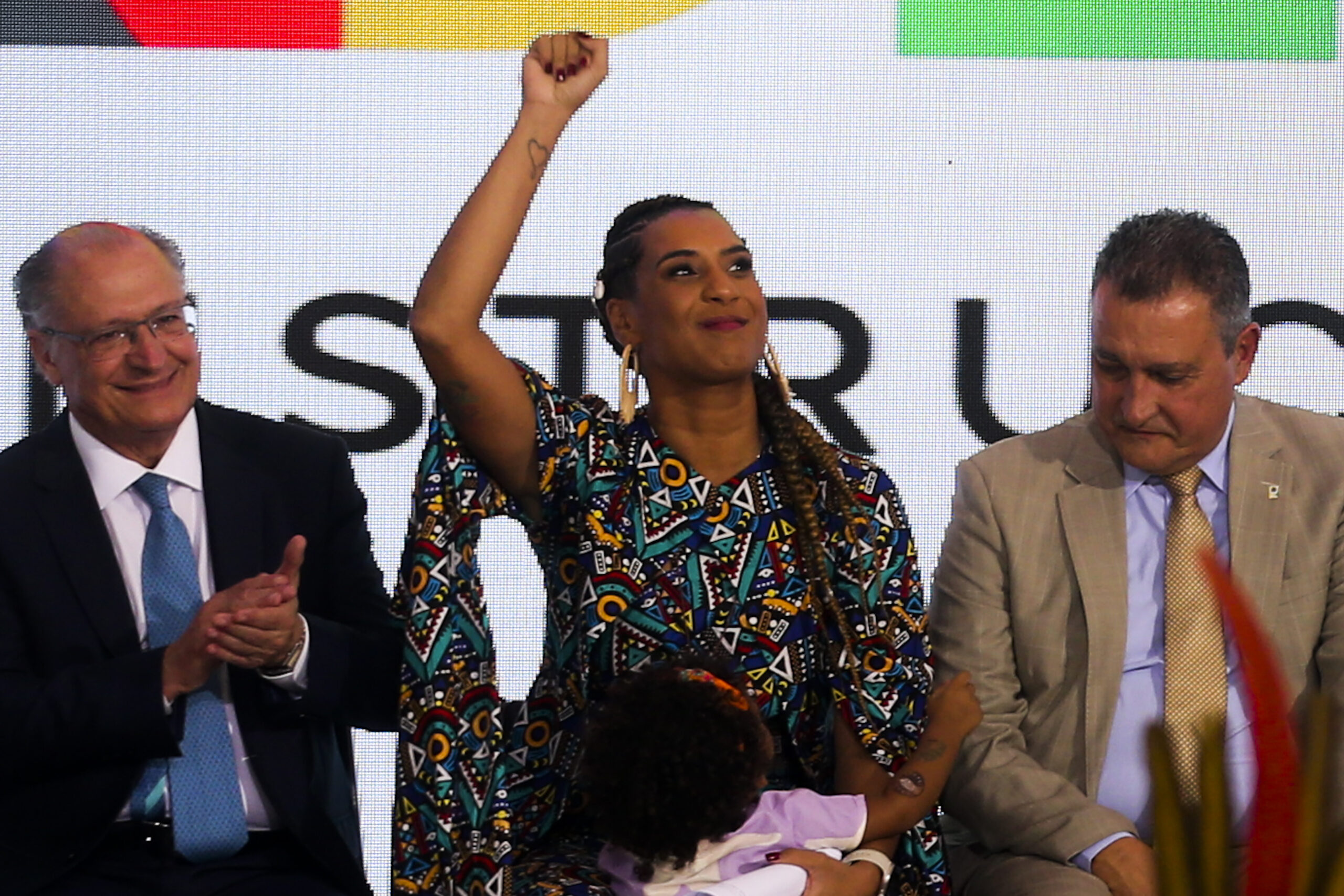
Thank you to the Marielle Franco Institute team, without whom nothing would have been possible during these last four years, and who have been fundamental in helping us realize this passage from grief to struggle. As well as the partners who helped us plant this seed, whom I greet in reverence here: our beloved Pedro, Átila, Marcelo, André, Henrique, Carô, Carol Proner, and Carol Lourenço.
Thank you especially to the transition working group for the precious work carried out in such a short amount of time, and that will serve as a horizon to guide our agendas and actions in the coming years.
I also thank the team with which I have worked incessantly since before the inauguration to build the Ministry of Racial Equality that the Brazilian people deserve. It is an honor and enormous responsibility to succeed figures like Matilde Ribeiro, Martvs Chagas, Edson Santos, Elói Ferreira Araújo, Luiza Bairros, and Nilma Lima Gomes, all people to whom I direct my most sincere deference and admiration.
I would like to take the opportunity to introduce to you and to salute our future secretaries and ministry team: Roberta Eugênio, who will lead the Ministry’s Executive Secretariat; Flávia Tambor, who took on the mission of being our Chief of Staff; Márcia Lima, who accepted to lead the Secretariat of Policies for Affirmative Action and Fighting and Overcoming Racism; Iêda Leal, who will be heading the Management Secretariat of the National System for the Promotion of Racial Equality – Sinapir; and Ronaldo dos Santos, our Secretary of Policies for Quilombolas, Traditional Communities, and People of African Descent, Terreiro and Cigano Peoples. To you all I direct my deepest gratitude for having accepted the challenge of, together, rebuilding and advancing policies of racial equality in this country.
Finally, but no less importantly, I thank the people that accepted our invitation to be here today on the stage of this inauguration ceremony and that represent the Brazil we would like to build, with the leadership of women, Black women, quilombolas, people of African descent, ciganos, young people, residents from the favelas and peripheries, and traditional peoples and communities.
Ever since March 14, 2018, the day they took Marielle away from my family and Brazilian society, I have dedicated every minute of my life to fighting for justice, defending her memory, multiplying her legacy, and watering my sister’s seeds. On this journey, we founded the Marielle Franco Institute, an organization that has become a reference in the battle against political gender-based and race-based violence and in defense of the rights of Black women, LGBTQIAP+ people, and marginalized peoples.
The days since the coup against President Dilma have been difficult, especially after 2018. I am certain of that for all that are here. But in the midst of a policy of death, our response was the fight for life.
A fight that brought us to the first day of January of this year, when the Brazilian people finally climbed this palace’s ramp in a remarkable gesture that moved the whole world, because it made a point. When our president received the presidential sash from the people, handed to him by a Black woman from the urban periphery, he showed that Brazil’s future path will be led by those who have resisted for centuries the violent project that founded this country.
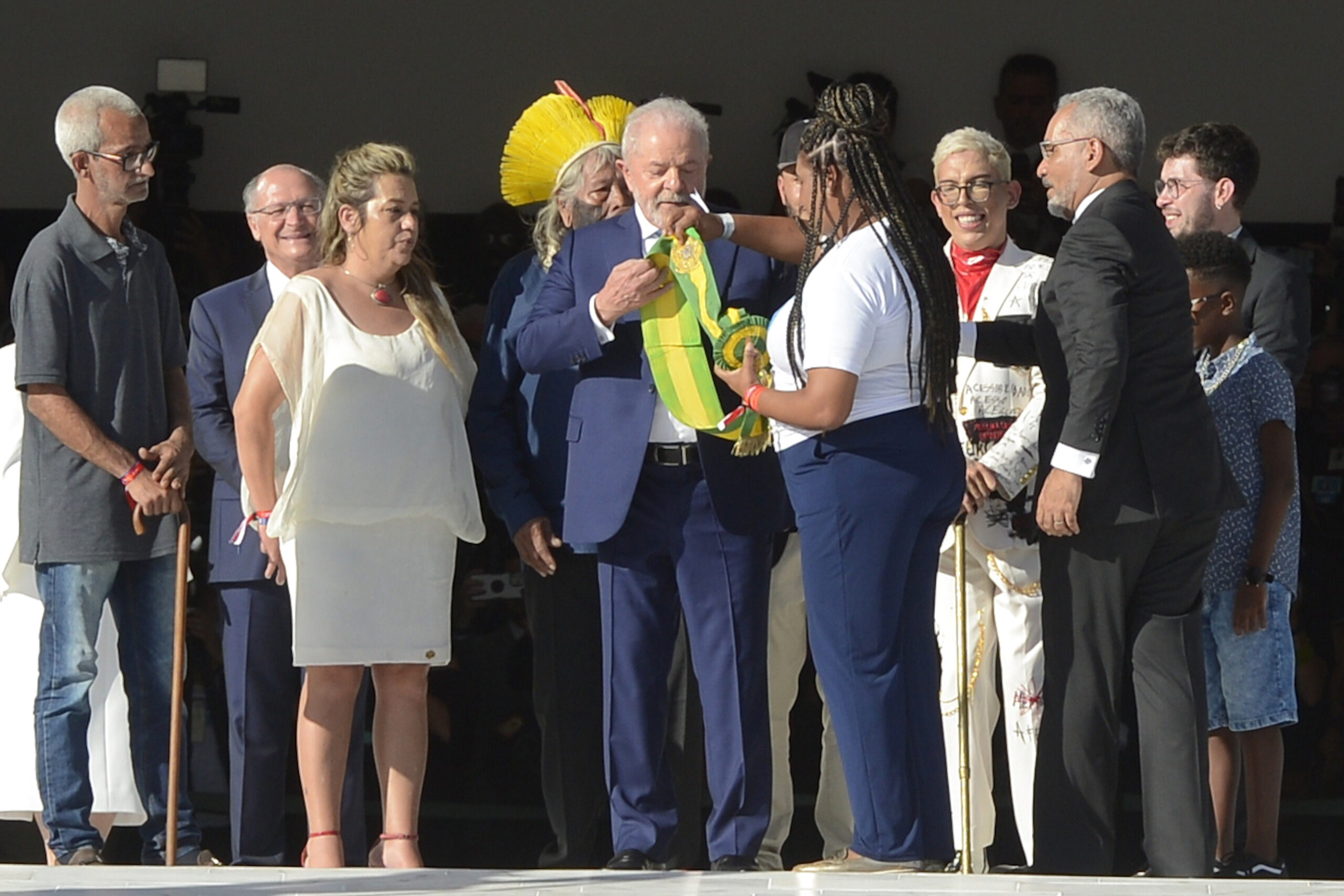
Today’s ceremony carries a very special symbolism. After the attacks suffered by this place and by the Brazilian people last Sunday, we stand here as a sign of resistance to each and every attempt to attack institutions and our democracy. Fascism, just like racism, is an evil that must be fought in our society.
The same project that permitted the destruction of this palace’s windows is the project that kills, every day, people like waste picker Dierson Gomes da Silva, from City of God, in Rio de Janeiro.
Fighting racism and fascism stems, as well, from the fight for justice, reparations, and democracy.
We need to identify and hold accountable those who insist on maintaining this policy of death and incarceration of our Black youth, which is a proven failure. Just as we are identifying and holding accountable those who executed, provoked, and financed the savagery we witnessed last Sunday.
As a society, we need to have a frank and honest conversation that countries all over the world are already having. We need to face the reality that these policies of war in the favelas and peripheries have never worked. On the contrary, they just continue to rip apart families and feed a cycle of endless violence.
If the world we want to live in is one where all people have the same right and opportunity to be happy, with freedom, respecting one another, in peace, harmony, justice and dignity, it’s high time we stop repeating the failed formulas that don’t deliver any of this!
And in this year of 2023, in which we are celebrating 20 years since Lula’s first term began in 2003, when the first Special Secretariat for Policies to Promote Racial Equality was created, we will take a step further in the institutionalization of the anti-racist political fight with [the creation of] this [new] Ministry. Bringing racism into the public and institutional debate in a way not yet witnessed in Brazilian politics, a victory that is fruit of the incessant social mobilization that preceded and culminated in this moment.
I say this because the most important subject and to whom I owe my gratitude on this day is the Brazilian people, especially Black and indigenous people, who have resisted against the State’s violence and organize themselves to occupy and endure in spaces like this one.
Today we have a Ministry of Racial Equality in Brazil, and I would like to affirm my commitment to every one of you, that the task that I was entrusted with, of occupying the post of Minister, will be executed with transparency, dedication, technical skill, forcefulness, and carefully, respecting the trajectories and achievements of social movements, with deep listening.
The doors to the Ministry of Racial Equality are open so we can dialogue and build together*. I say these words thinking as well of the honorable ministers with whom I share the challenge of unifying and rebuilding.
And, for us, it wouldn’t be possible to talk of rebuilding without thinking of our memory and of those who came before us, of the restoration of the achievements that have been threatened by setbacks in the last few years and the reparation, above all, of what we have not yet been able to look at with due attention and care.
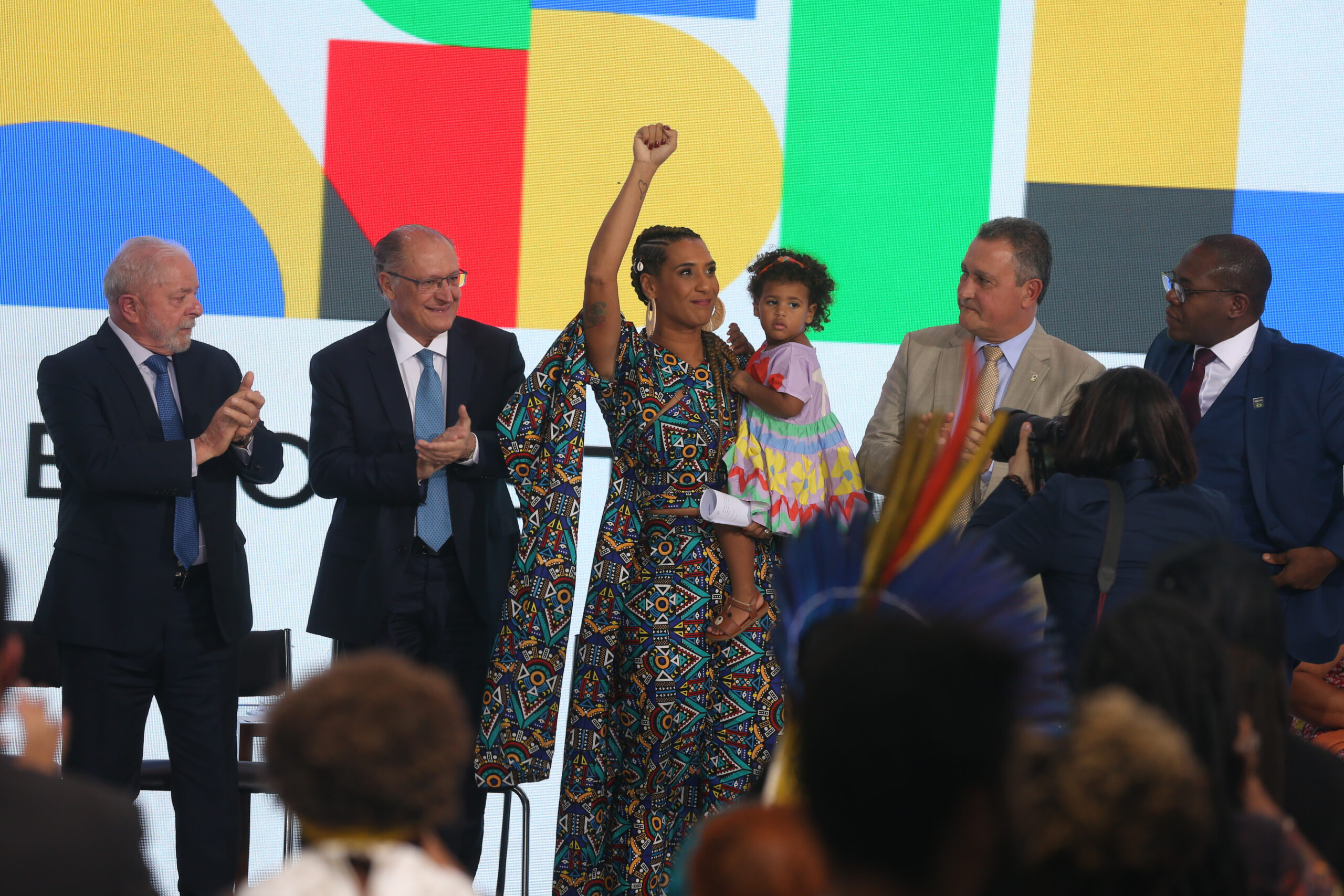
After almost 400 years of Black slavery, and 133 years of an abolition that was never finalized, the Brazilian people still face multiple facets of a racism that creates unequal conditions of life and death for Black and non-Black people in the country. This can neither be forgotten nor cast aside.
It is regrettable and inadmissible to think that in the face of one of the cruelest social cornerstones of our history, if not the most cruel—the enslavement of Black people brought from the African continent, facing torture, rape, murder and a series of other violations—there are still people who question the importance of a ministry like the Ministry of Racial Equality in Brazil.
From the kidnapping of our great-grandparents and great-great-grandparents in Africa to the fight for the guarantee of public policies and the existence of the Ministry of Racial Equality, including with regard to budget commitments, we have been viscerally committed to a project of survival. A project that goes from fighting scientific racism and its eugenicist policies, of whitening and annihilation of the Black population, to the demystification of the narratives of meritocracy and racial democracy in Brazilian society.
Economic inequality, hunger, lack of jobs and job insecurity, the dismantling of affirmative action policies, insufficient social policies, the collapse of the health system, religious and environmental racism, State violence, and incarceration: these are a few of the examples we can mention to illustrate multiple dimensions of the genocide of the Black population.
We can’t not mention the denialism of the previous federal government in relation to the policies to prevent and fight Covid-19, as well as the delay of vaccination, among other issues that culminated in results that hit the Brazilian population so unequally, disproportionately affecting the Black population. I stand in solidarity with all the people who lost family members, loved ones, and friends as a result of the pandemic we went through. I salute all the health professionals that worked on the frontlines in this difficult moment of our history, especially the Black women and men that work at the forefront of this system.
We are talking of hierarchical racial differences that establish unequal material conditions of life and death for Brazilians. We can no longer ignore or underestimate the fact that race and ethnicity are determining factors in the inequality of opportunities in Brazil in all areas of life. Black people are underrepresented in spaces of power and, conversely, we are the majority in spaces of stigmatization and vulnerability.
Although the majority of the Brazilian population self-identifies as Black, we can see that white people occupy the greater part of managerial roles, formal jobs, and elected office. On the other hand, the Black population is at the top of the unemployment, underemployment, and informal occupation indices, as well as receiving the lowest salaries.
The Black population is more exposed to illiteracy, to the worst housing conditions, being in fact the great majority of people who live below the poverty line. Black people are also the ones most killed in Brazil, especially as victims of police lethality; and Black women are also the majority of victims of femicide and the ones most exposed to maternal mortality and obstetric violence.
Black men and women also correspond to the largest proportion of the country’s incarcerated population, most of whom are actually in pre-trial detention, without a formal sentence.
After all, what Rule of Law are we speaking of? This is definitely not the model of racial democracy we want. As the Black Coalition for Rights, comprised of over 200 of the country’s Black organizations, reminds us: as long as there is racism, there will be no democracy.
I reiterate what was said in President Lula’s inauguration speech: the Brazil of the future needs to respond to the debts of the past! And that is why, in a government of rebuilding, we would also like to speak to non-Black people. The fight against racism and the promotion of racial equality is everyone’s duty. The Brazilian people cannot be burdened with the costs of the violations of which it is a victim.
We hope we can count on you for this task of rebuilding as we strive for respect, citizenship, dignity, and equality of opportunities. And, I direct myself in particular to my colleagues whose ministries cannot work without a precise and transversal reading of racism and race in Brazil. And, also for this reason, the Ministry of Racial Equality makes itself available to rebuild this new Brazil collectively. The commitment to Racial Equality in Brazil cannot be this Ministry’s commitment alone!
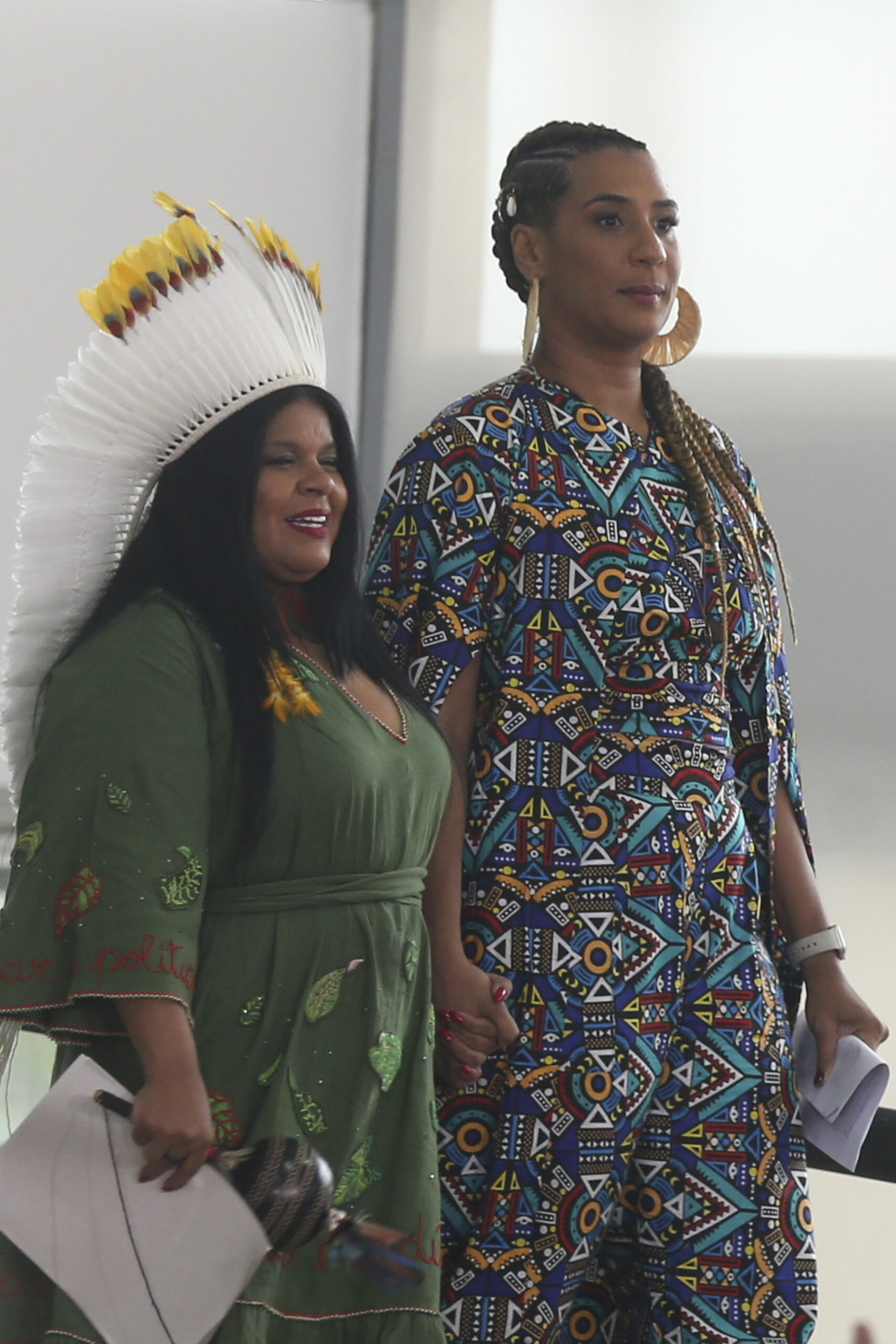
To the dear [fellow] ministers Marina Silva and Sônia Guajajara, you can count on the Ministry of Racial Equality to defend our indigenous peoples and our environment, fighting against what we recognize as environmental racism and for climate justice. After all, it is us who suffer the most with floods, landslides, and illnesses brought on by climate change.
To the dear ministers Simone, Esther, and Professor Haddad, you can count on the Ministry of Racial Equality so we can materialize the promise that President Lula has repeated so many times throughout his campaign: to include the poor in the national budget. We know the color of the poorest people in this country, and we will fight relentlessly to give dignity to our people in the form of public policies.
To my dear ministers Nísia Trindade, Margareth Menezes, Ana Mozer, Luciana Santos, and Camilo Santana, you can count on the Ministry of Racial Equality so we can develop policies for education, health, culture and sports, science, technology, and innovation that will be essential to guarantee the right to a future and to a dignified life for the Black Brazilian population.
To the dear ministers Flávio Dino, Silvio Almeida, and Cida Gonçalves, you can count on the Ministry of Racial Equality so we can promote the true social, racial, and gender justice this country needs to achieve.
To all my other ministerial colleagues, the Federal Attorney’s Office led by my colleague Jorge Messias, the Federal Comptroller’s Office led by my dear Vini, secretariats, and other parliamentarians and authorities present, you can count on the Ministry of Racial Equality so we can promote internal and external policies that will effectively guarantee the democracy we dream of.
We will only experience true democracy from the moment concern with the dignity of the Black population is also a concern of every other ministry, and we hope to be able to count on you to tackle this challenge. We can only give an effective response to the debts of the past if we work together.
We recognize the social movements’ demands in relation to the need for an institutional framework specifically for the formulation, coordination, and articulation of government policies and guidelines that promote racial equality. To the movements, organizations, and civil society, you can count on the Ministry for Racial Equality to reclaim our power of institutional agency.
We need to confront the stripping and weakening of racial policies that were achieved and built throughout the history of confronting racism and promoting racial equality in Brazil. Our priority is to fight for the strengthening and expansion of policies that culminate in dignity of life for the Black Brazilian people.
It is on this historic day that the true Brazil takes hold, from the pen of our President Lula and with the weight of many generations’ fight for the criminalization of racism, we take another step forward on the path of promoting reparation and equality. I salute all the legal experts, ministers, and secretaries involved in drafting the law that will now be signed and which signals a country of the future without racism.
We also commit ourselves here to the revocation of acts that do not reflect the Ministry of Racial Equality’s mission and the promotion of concrete policies.
- In the next four years we will work to strengthen affirmative action legislation and increase the presence of low-income and Black youth in public universities;
- We will seek to increase the visibility and presence of Black civil servants in decision-making and public administration roles;
- Together with partner ministries we will relaunch the living Black youth plan, which will promote initiatives that seek to reduce lethal violence against Black youth and the expansion of opportunities for young people in our country;
- We will advance in an inter-ministerial coordination for the strengthening of national health policy for the Black population;
- We will resume programs that propagate rights for quilombola and cigana communities, including for land titling, infrastructure, inclusive production, and local development with rights and citizenship for these peoples;
- Through a greater structuring and strengthening of the National System for the Promotion of Racial Equality, we will carry out initiatives that seek racial equity in dialogue with all municipalities, states, and federal bodies.
These will be the first measures on a long path to recover what has been destroyed and strengthen and expand the legacy that has been under construction for so many generations.
It’s vital we recognize that this country was founded on racial hierarchies, consequences of colonial slavery, eugenicist policies, and narratives based on racial inequality. It was here that ‘Brazilian-style racism’ was developed, denying our history and distorting a memory in favor of the farce of racial democracy. Racism warrants an effective response, and we would like to invite everyone; women, men, and non-binary people, Black and white, to formulate and execute this proposal together.
We are here because we have a new NATIONAL PROJECT: a project for a country where a Black woman can access and participate in different decision-making positions of society, without having her life torn away with five shots to the head, without being interrupted or violated.
A project for a country where a mother of a young Black man does not suffer every day doubting whether her son will come home because he runs the risk of being murdered by the State itself.
A project for a country where our Black youth can have access to free, quality, public education through schools and universities, and public services that allow them to dream and build other possibilities for the future.
A project for a country in which Black, white, indigenous, traditional populations, and all people regardless of race, color, ethnicity, gender, and sexuality have their constitutional rights guaranteed, and are treated with dignity and equal opportunities.
A national project based on the search for collective well-being, for the improvement of quality of life, and for the guarantee of citizenship.
We have a national plan and hope to be able to count on you for this construction. And this is why I make this request to the entire Brazilian population: walk with us.
Walk with us down this road where our ancestors walked and where our children will walk.
Walk with us until our people are truly free, protagonists in their own journeys, with access to rights, dignity, and a full life with justice, reparation, and happiness.
Walk with us until our ancestor’s dreams come true.
I would like to end this speech with a poem that is very special to me and that represents a little of everything we wanted to bring here today.
Women-Voices — Conceição Evaristo
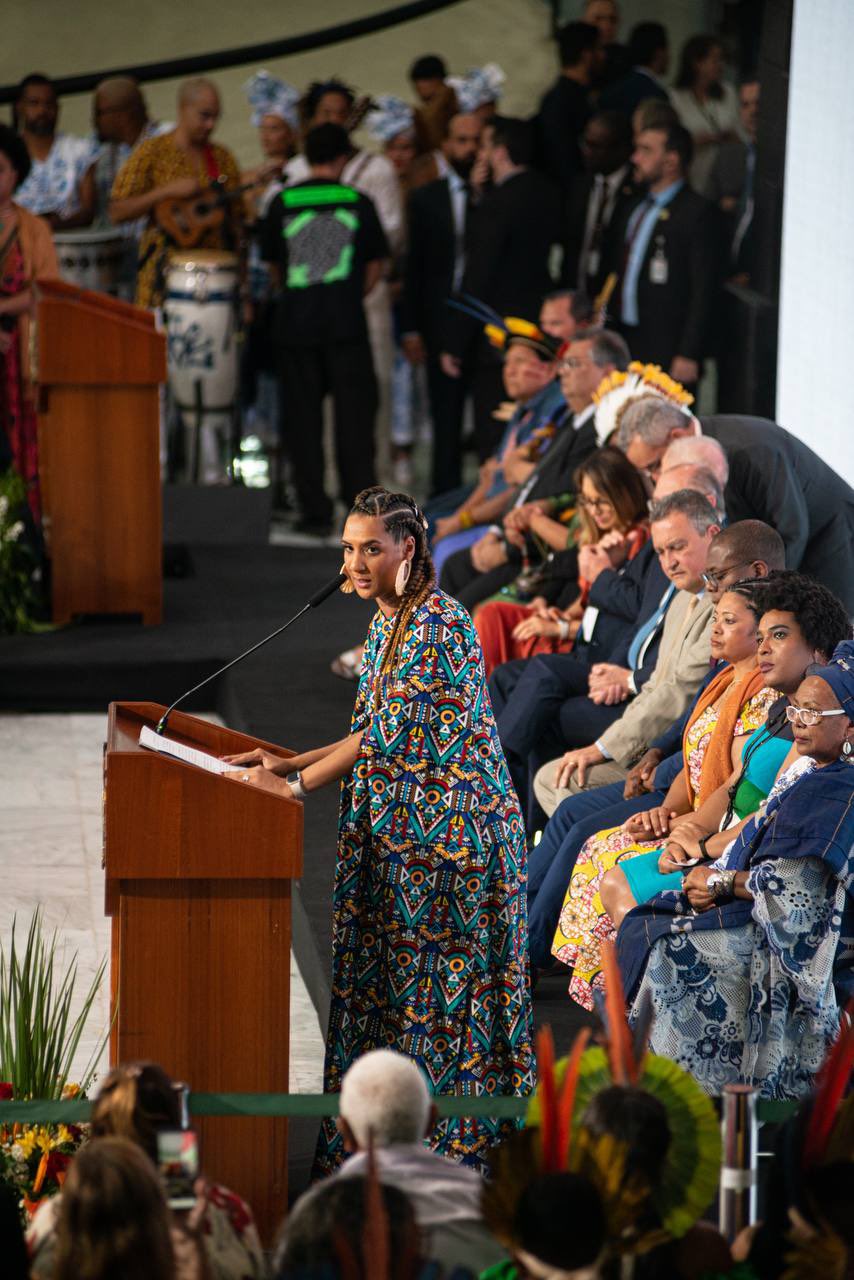
My great-grandmother’s voice
echoed as a child
in the ship’s hold.
Echoed sorrows
of a lost childhood.
My grandmother’s voice
echoed obedience
to the whites-owners of everything.My mother’s voice
quietly echoed rebellion
in the back of distant kitchens
under the bundles
white people’s dirty clothes
on the dusty path
on the way to the favelaMy voice still
echoes perplexed verses
with rhymes of blood
and
hunger.My daughter’s voice
gathers in it all our voices
gathers in itself
the mute silenced voices
choked in throats.My daughter’s voice
gathers in itself
the speech and the act.The yesterday—the today—the now.
In my daughter’s voice
the resonance will make itself heardThe echo of life-freedom.
We are these daughters, and we will not rob ourselves of the speech and the act. We will not retreat!
We will create the Ministry of Racial Equality that the Brazilian people deserve. Thank you to each one of you that came here today, to those who couldn’t get in, to those who are watching from home, in the street, on public transport, I thank above all, all the Black women who built this country in anonymity.
As in the verses of a song considered an anthem for the Black women’s movement, sung at the end of the first national meeting of Black Brazilian women in 1988, in Valença, in Rio de Janeiro:
Free Africa,
in its trenches
How many anonymous
Brazilian warrior women
once again
Free Africa,
Has its trenches
How many anonymous
Brazilian warrior women.
I thank you again for your trust in this collective project, we did not get here alone and we will continue together reaffirming our commitment to work day and night for a Brazil of the future with equality, justice, and reparations for all people.
Let’s walk together.
*Frequently during her acceptance speech in Portuguese, Anielle Franco used the feminine pronoun, going against standard historical Portuguese usage of the male pronoun to communicate her broader and inclusive approach.
